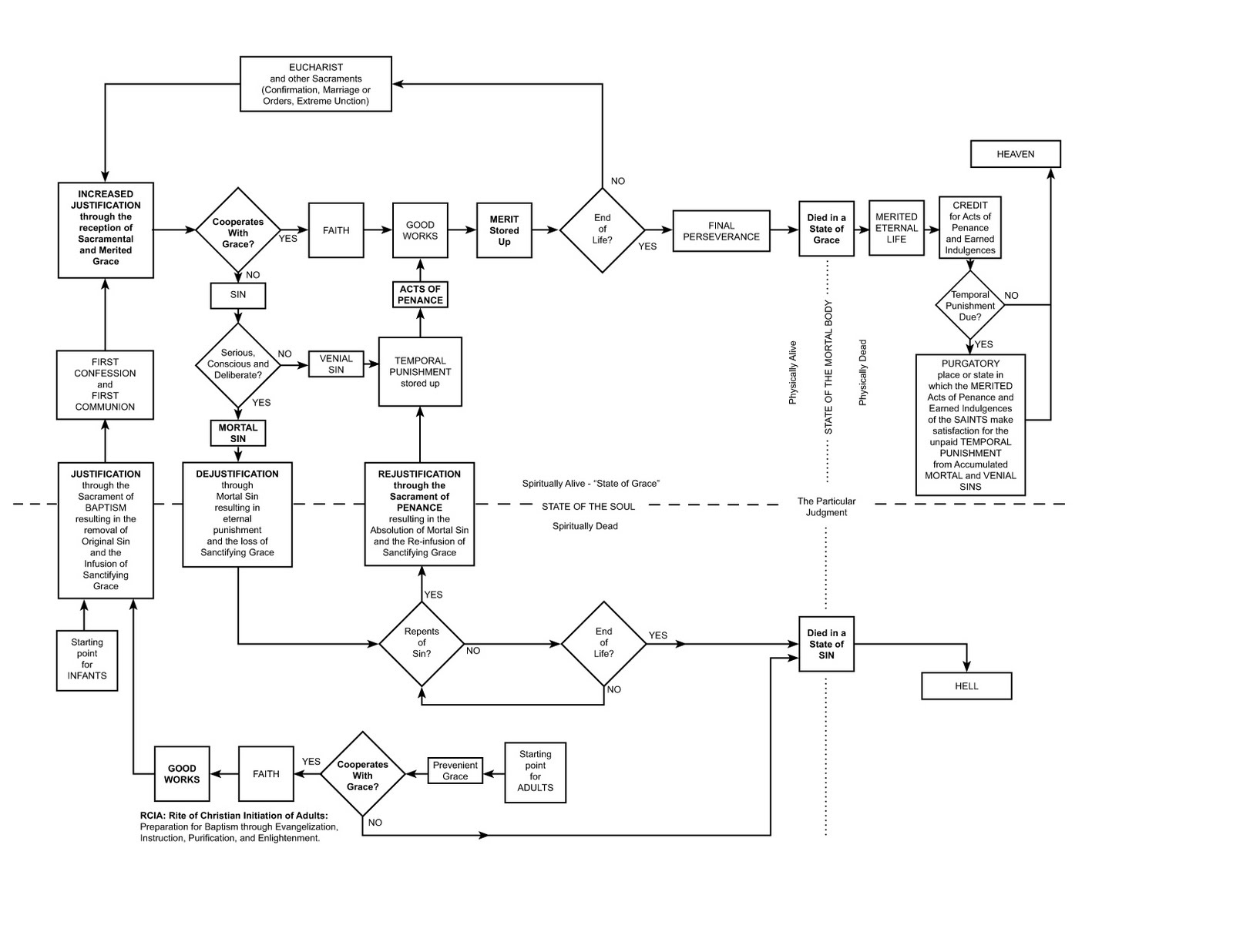In Catholic theology it's salvation by grace + active sanctification via the sacraments. It's not by works but it is a mix of the two.
Notes and quotes from chapter 7 of Schaff’s History of the Christian Church. (Schaff had a killer beard!)THE SACRAMENTARIAN CONTROVERSIES: 101. Sacerdotalism and Sacramentalism.
Roman Catholic and Eastern Orthodoxy:
The Catholic system of Christianity, both Greek and Roman, is sacramental and sacerdotal. The saving grace of Christ is conveyed to men through the channel of seven sacraments, or “mysteries,” administered by ordained priests, who receive members into the church by baptism, accompany them through the various stages of life, and dismiss them by extreme unction into the other world. A literal priesthood requires a literal sacrifice, and this is the repetition of Christ’s one sacrifice on the cross offered by the priest in the mass from day to day. The power of the mass extends not only to the living, but even to departed spirits in purgatory, abridging their sufferings, and hastening their release and transfer to heaven.
The Reformed Church:
The Reformers rejected the sacerdotal system altogether, and substituted for it the general priesthood of believers, who have direct access to Christ as our only Mediator and Advocate, and are to offer the spiritual sacrifices of prayer, praise, and intercession. They rejected the sacrifice of the mass, and the theory of transubstantiation, and restored the cup to the laity. They also agreed in raising the Word of God, as the chief means of grace, above the sacraments, and in reducing the number of the sacraments. They retained Baptism and the Lord’s Supper, as instituted by Christ for universal and perpetual observance.
Lutheranism:
The Lutheran Confession is, we may say, semi-sacramental, or much more sacramental than the Reformed (if we except the Anglican communion). It retained the doctrine of baptismal regeneration, with the rite of exorcism, and the corporal presence in the eucharist. The Augsburg Confession makes the sacraments an essential criterion of the church. Luther’s Catechism assigns to them an independent place alongside of the Commandments, the Creed, and the Lord’s Prayer. It adds to baptism and the Lord’s Supper confession and absolution as a third sacrament. At a later period, confirmation was restored to the position of a quasi-sacrament as a supplement of infant-baptism.
Zwingli and Calvin Agree:
Zwingli and Calvin reduced the sacraments to signs and seals of grace which is inwardly communicated by the Holy Spirit. They asserted the sovereign causality of God, and the independence of the Spirit who “bloweth where it willeth” (John 3:8). God can communicate his gifts freely as he chooses. We are, however, bound to his prescribed means. The Swiss Reformers also emphasized the necessity of faith, not only for a profitable use of the sacrament (which is conceded by the Lutherans), but for the reception of the sacrament itself. Unworthy communicants receive only the visible sign, not the thing signified, and they receive the sign to their own injury.
On Things That Differ:
These theories are not isolated; they proceed from different philosophical and theological standpoints, and affect other doctrines. Luther was not quite wrong when he said to Zwingli at Marburg “You have a different spirit.” Luther took his stand on the doctrine of justification by faith; Zwingli and Calvin, on the doctrine of divine causality and sovereignty, or eternal election. Luther proceeded anthropologically and soteriologically from man to God, Zwingli and Calvin proceeded theologically from God to man.
The Roman doctrine of transubstantiation is the outgrowth of a magical supernaturalism which absorbs and annihilates the natural and human, leaving only the empty form. The Lutheran doctrine implies an interpenetration of the divine and human. The commemorative theory of Zwingli saves the integrity and peculiar character of the divine and human, but keeps them separate and distinct. The eucharistic theory affects Christology, the relation of church and state, and in some measure the character of piety. Lutheranism inclines to the Eutychian, Zwinglianism to the Nestorian, Christology. The former fosters a mystical, the latter a practical, type of piety.
Calvin’s View According to Schaff:
Calvin, who appeared on the stage of public action five years after Zwingli’s, and ten years before Luther’s, death, advocated with great ability a eucharistic theory which mediates between the Lutheran realism and the Zwinglian spiritualism, and which passed into the Reformed confessions Luther had to deal with Zwingli, and never came into contact with Calvin. If he had, the controversy might have taken a different shape; but he would have maintained his own view of the real presence, and refused the figurative interpretation of the words of institution.
With the doctrine of the eucharist are connected some minor ritualistic differences, as the use of the wafer, and the kneeling posture of the communicants, which the Lutherans retained from the Catholic Church; while the Reformed restored the primitive practice of the breaking of bread, and the standing or sitting posture. Some Lutheran churches retained also the elevation of the host; Luther himself declared it a matter of indifference, and abolished it at Wittenberg in 1542.
Online source.


